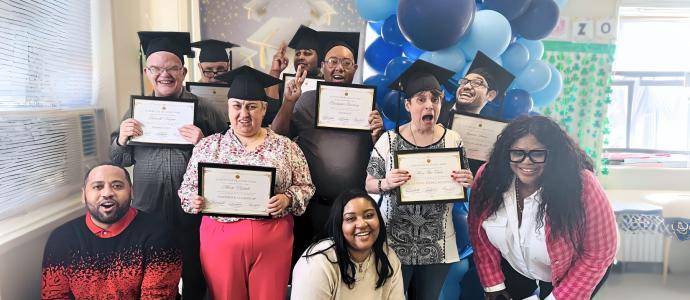When Hal Rubin walked into his first peer support group in Queens in November 2024, the grief of losing his fiancée still hung heavy. Daily life felt almost unbearable. But that first day, as he spoke in a room full of people who listened without judgment, something began to shift. Rather than being consumed by his pain, Rubin started to recognize the strength it took just to show up.
“Sharing my story and hearing others support me made me realize I'm not alone for the first time in a while,” said Rubin. “I knew I had to keep going.”
This moment truly captures the essence of Positive Interactive-Behavioral Therapy (P-IBT) Peer Support Groups: strength-based spaces where people with intellectual and developmental disabilities (I/DD) heal, connect, and grow through empowerment.
“Hal came into that first session with the weight of the world on his shoulders, but by the end, he was standing taller,” said Abby Baker-Lynch, a Behavior Intervention Specialist (BIS) in Queens and facilitator of the group. “He showed his peers that it’s possible to carry grief and still move forward.”
The P-IBT groups are a key part of YAI's Supportive Res Hab Transformation grant. Awarded by the New York State Office for People with Developmental Disabilities in February 2023, this grant runs through September 2025. Its main goals are to:
- Reduce isolation
- Increase independence
- Help people with intellectual and developmental disabilities (I/DD) live in integrated, community-based settings by building natural supports.
Other initiatives under this grant include:
- Trainings for families and care managers on supportive housing and independent living.
- Person-centered tech supports tailored to individual needs.
- Social skills groups like YAI Connections, offering monthly events such as game nights, speed dating, and cooking classes.
Under the guidance of Dan J. Tomasulo, a pioneer in positive psychology, 13 YAI Behavior Intervention Specialists and residential staff were trained to lead the P-IBT groups across four regions: Westchester, Queens, Brooklyn, and the Bronx. Over ten weeks, the groups brought together 44 people from YAI residences to talk, reflect, and grow together.
According to recent studies, people with I/DD experience depression at rates up to three times higher than the general population, often exacerbated by social isolation and loss. Studies show that positive psychology interventions reduce depressive symptoms by 25–35% and improve social engagement by over 40% in this community.
The sessions created safe, stigma-free zones rooted in positive psychology, where nothing was off-limits. They combined positive psychology principles, character strengths, and therapeutic techniques to foster deeper emotional expression and healing. For example, the doubling technique involves another participant voicing someone’s feelings or thoughts, which helps clarify and validate emotions. Similarly, the empty chair exercise invites participants to imagine speaking directly to someone important, often a person they have unresolved feelings about, to express thoughts and find closure.

Laquane Suarez, a 28-year-old who lives in one of YAI’s Brooklyn residences, used the empty chair technique to find closure around a long-term relationship with his ex-fiancée, which ended in 2021.
“I started to pretend that she was there sitting in the chair, and I told her that I’m done,” Suarez said. “I was able to set her free and set myself free after everything.”
“When people were vulnerable, the group didn’t shy away, they leaned in,” said Derreck Johnson, a BIS in Brooklyn who led Suarez’s group. “That kind of support is hard to teach but it came naturally once they saw each other’s strengths.”
This real-life experience reflects broader research: a systematic review in Developmental Neurorehabilitation examined 357 studies involving over 4,000 people with I/DD and found that peer-mediated interventions like these significantly enhance social engagement and interactions, fostering the empowerment and autonomy essential for independent living success.
Every meeting centered on character strengths. Participants identified and explored their unique qualities, like kindness, bravery, and leadership, celebrating these at graduation with a diploma. What they learned became practical tools they could apply in real life. For example, one participant used role play to handle roommate conflicts. Another, who frequently called 911 due to anxiety, discovered healthier ways to manage emotions and express his needs. Additionally, a group member grieving his father’s death used the doubling technique outside the sessions to support a housemate coping with a similar loss of a parent.
The weeks together brought participants closer, making graduation day emotional for many.
“It was really hard to say goodbye to everyone because I knew I wasn’t going to see them for a long time,” said Suarez. “But I’ve come a long way, and I am proud of myself.”
His character strengths, revealed during graduation, were humor and bravery.
“When you see people in a positive light and build on their strengths, they respond and that’s when real growth happens,” said Baker-Lynch.

